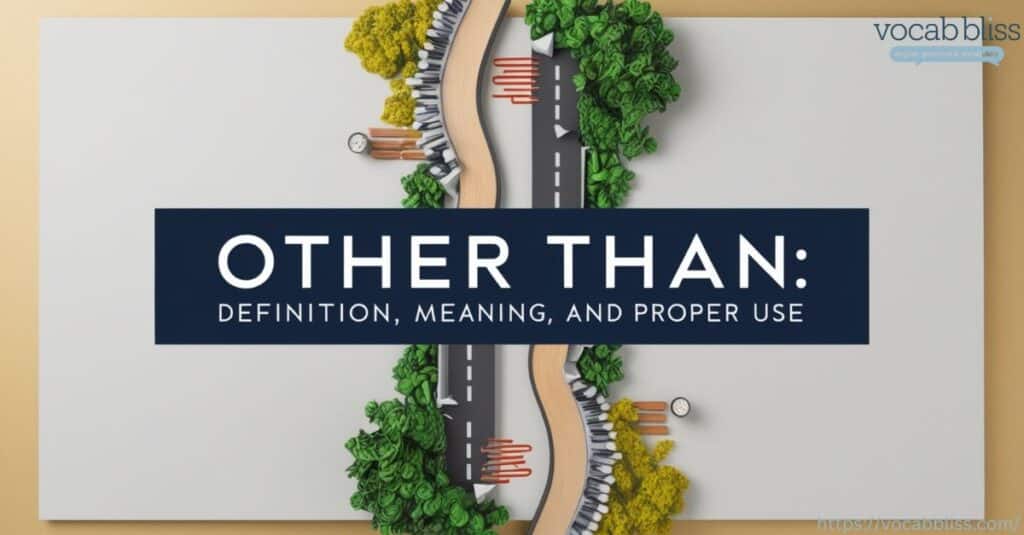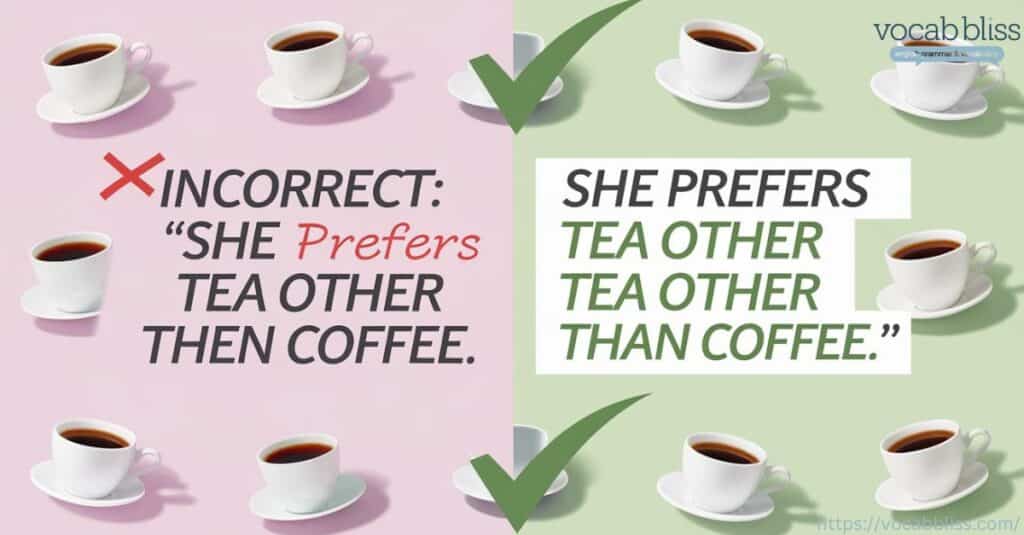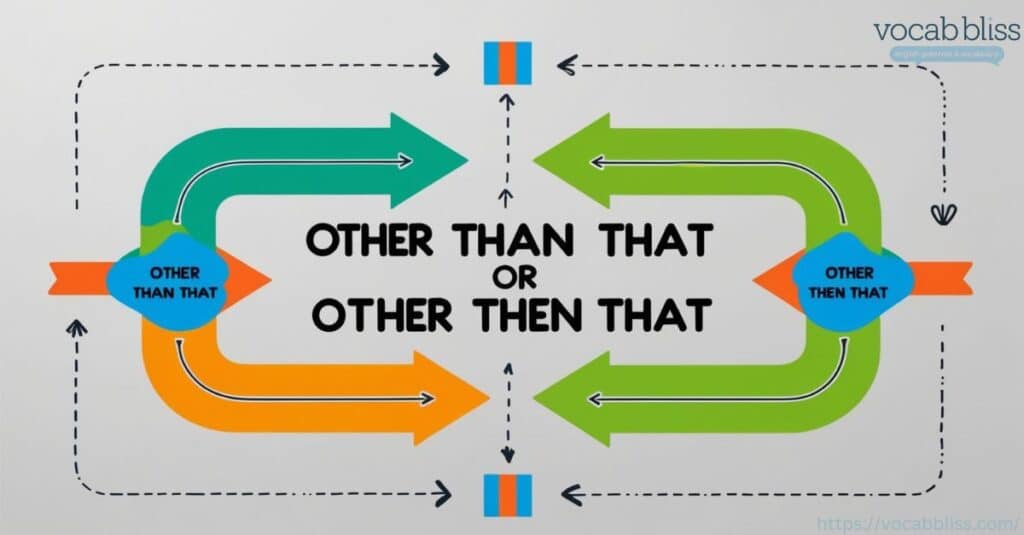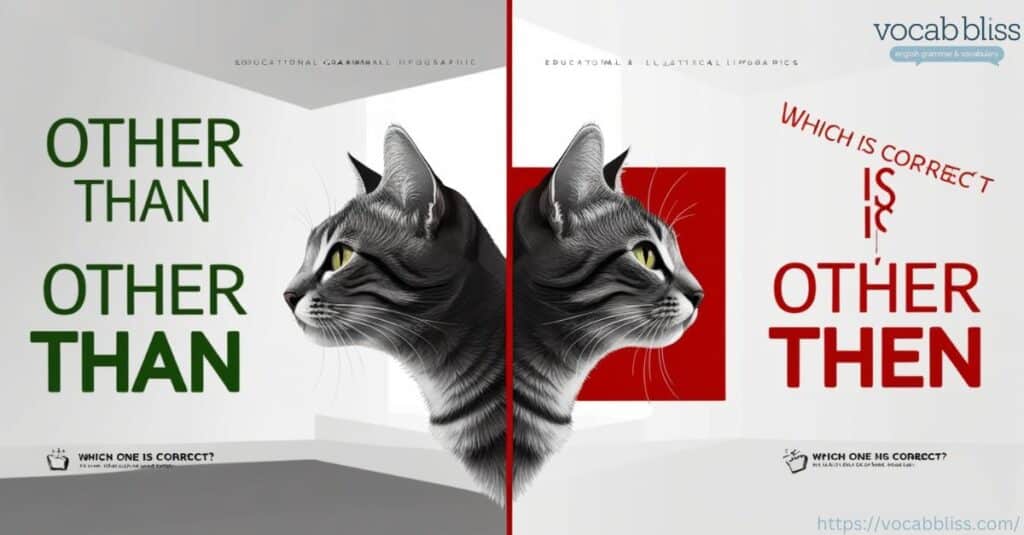In the English language, subtle differences between phrases can create confusion. A common source of error arises between “other than or other then”. Both sound similar, but they serve entirely different purposes in writing. This article will dissect their meanings, correct usage, and provide clear examples to ensure you can confidently use them in your writing.
⚡ Quick Overview
It’s easy to mix up “other than or other then”. The key distinction lies in their grammatical roles. The phrase “other than” means “except for” or “excluding,” while “other then” is a typographical or grammatical error. It results from confusing “then,” which indicates time or sequence, with the correct prepositional phrase.
Explore further: Cacoon or Cocoon: Which Spelling is Correct?
Understanding the Differences Between “Other Then or Other Than”
“Other Than”: Definition, Meaning, and Proper Use

Definition: The phrase “other than” acts as a prepositional phrase that means “apart from”, “besides”, or “excluding”. It’s typically used to indicate exceptions or exclusions within a sentence.
Correct Usage:
- “Other than” is used when you want to make an exception in a statement.
- It connects clauses or highlights something that stands out.
Examples:
- “I have read every book on that shelf other than the dictionary.”
- “There was no sound other than the rustling of the leaves.”
Synonyms and Related Terms:
- Except for
- Besides
- Aside from
- Excluding
“Other Then”: Why It’s Incorrect
Definition: The phrase “other then” is an incorrect construction that arises from mistakenly using “then” instead of “than”. The word “then” is used to denote time or sequence (e.g., “I went to the store, and then I came home.”). It should not be used to create exceptions.
Common Misuse:
- Incorrect: “She prefers tea other then coffee.”
- Corrected: “She prefers tea other than coffee.”

Why It’s a Grammatical Error:
Using “then” in place of “than” alters the sentence’s intended meaning and leads to confusion. “Then” implies a subsequent action or result, while “other than” establishes a contrast or exclusion.
Examples of Common Mistakes:
- Incorrect: “No one came to the party other then John.”
- Correct: “No one came to the party other than John.”
Direct Comparison: “Other Than vs Other Then”
To make this clearer, here’s a table showcasing the differences:
| Phrase | Meaning | Correct Usage | Example |
|---|---|---|---|
| Other Than | Indicates exception or exclusion | Standard phrase | “Everyone attended other than Sarah.” |
| Other Then | Typographical/grammatical error | Incorrect usage | N/A (incorrect in context) |
Key Differences:
- “Other than” is a proper phrase in English, while “other then” is simply an error.
- “Other than” functions as a preposition, whereas “then” is an adverb indicating time or consequence.
Real-Life Examples to Illustrate the Correct Usage “Other Then vs Other Than”
Understanding how these phrases fit into everyday language is crucial for clarity. Let’s review some sentences:
Examples Using “Other Than”:
- “There is nothing left on the menu that I like other than the salad.”
- “He contributed to every project this month other than the last one.”
Correcting Sentences with “Other Then”:
- Incorrect: “I can’t think of anyone else other then him who deserves the award.”
- Correct: “I can’t think of anyone else other than him who deserves the award.”
Common Writing Mistakes
Writers, especially in informal settings, often swap “than or then” due to their similar sounds. Here are some practical tips to avoid this common error:
Tips to Remember:
- “Than” is used for comparisons or exceptions (e.g., “other than,” “better than,”).
- “Then” refers to time (e.g., “and then,” “back then,”).
“Other Than That or Other Then That”

When deciding between “other then that or other than that,” it’s crucial to use the correct form. The proper phrase is “other than that,” which means “besides that” or “apart from that.” This expression indicates an exception or adds context to a previous statement.
On the other hand, “other then that” is a common grammatical mistake. The word “then” refers to time or sequence and cannot be used to express comparison or exception. Using “other than that” correctly makes your writing clearer and more professional.
Quick Comparison Table
| Phrase | Correct/Incorrect | Meaning | Example |
|---|---|---|---|
| Other Than That | Correct | Besides/Apart from | “She was tired, but other than that, she was fine.” |
| Other Then That | Incorrect | No valid meaning | N/A |
Always ensure you’re using “other than that” to maintain grammatical accuracy and clarity in your writing.
Common Questions About “Other Than vs Other Then”
Can “Other Then” Ever Be Correct?
In standard English grammar, “other then” is not correct. The only time “then” should be used is when referencing time or sequence, not exceptions.
Why Do People Mix Up “Other Then vs Other Than”?
The confusion often arises from quick typing errors or misunderstanding the roles of “then” and “than”. Ensuring you understand the purpose of each word helps in avoiding this mistake.
Tips to Remember the Correct Usage
Mnemonic Devices:
- “When you mean exception, it’s ‘other than.’ When talking about time, use ‘then.’”
- Think of “other than” as excluding, and remember “then” is later.
Practical Tips for Avoiding Mistakes
- Read Aloud: When proofreading, reading aloud helps catch mistakes where “then” has been misused.
- Double-Check Your Comparisons: When using words that compare or exclude (e.g., “rather than,” “more than,”), check that “than” is correct.
- Use Grammar Tools: Spell-checkers and grammar apps often highlight misuse of “than” and “then.”
Exercises for Practice
Try rewriting these sentences with the correct phrase:
- “Nobody wanted the task other then the volunteer.”
- “I didn’t see anything different other then the usual options.”
Answer Key:
- Correct: “Nobody wanted the task other than the volunteer.”
- Correct: “I didn’t see anything different other than the usual options.”
Conclusion
Mastering the difference between “other than or other then” is essential for clear, professional writing. Remember that “other than” is the standard phrase for indicating exceptions, while “other then” is simply a common grammatical error. With the help of examples, comparison tables, and practical tips, you can now use “other than” correctly in any context.
Dive Deeper:
- Priviledge Or Privilege: What Is The Correct Spelling?
- Drier or Dryer: What’s The Difference?
- Traveler or Traveller: Which Spelling is Right?
- Momma or Mama: Clearing Up the Confusion

Jorge Phillips is an experienced blogger who writes for Vocab Bliss, sharing his passion for the English language. With a knack for simplifying complex grammar rules and a focus on commonly confused words, Jorge helps readers navigate the nuances of English with ease. His insights aim to make learning engaging and practical.







